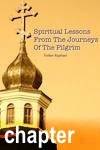 As Christ promised, a gathering of Christ-minded people will grow spiritually together, and pray powerfully together.
As Christ promised, a gathering of Christ-minded people will grow spiritually together, and pray powerfully together.
Dear beloved,
The pilgrim met his spiritual father together with a professor, a priest, and a skhimnik (a Russian Orthodox monk of strict observance, akin to say, Roman Catholic Trappist monks).
The professor first started with his story. He was leading a luxurious and wasteful life. He met a young Frenchman who wanted to introduce him to some amoral activities one day, at the professor’s study. The young man told the professor that both of them should continue discussing their activities outside the study instead. The professor was puzzled and asked why. The young man said that there was a New Testament sitting in the professor’s study, and he felt uncomfortable discussing amoral activities in front of the Holy Scripture. The professor took the New Testament, and handed to the young man to put it in another room. As soon as the young man came into contact with the Holy Book, he trembled, and disappeared!
The professor was shocked and fainted, and when he woke up, his limbs were paralyzed and had to lie in bed. He resigned from his teaching position after his mother died and his sister entered a monastery. Despite all these traumatic experiences, the New Testament was frequently in the professor’s hands. One day, a hermit came, and told the professor to trust in the mercy of God through prayer, rather than rely on medicines. The professor prayed, and his symptoms of trauma and depression subsided.
The skhimnik commented that the professor was an educated man and so should not fall into despair, especially after the immense mercy and healing from God (Hebrews 11:6).
“No one should despair and proclaim the Gospel to be unattainable. In laying the foundation for man’s salvation, God did not issue commandments intending them to be impossible to attain so that man would turn to sin, but rather, are intended that through a journey to holiness through the commandments, we will be blessed while living and in eternity.” – Saint John Chrysostom, father among the saints, often called the “Golden Mouth”.
The skhimnik lamented that contemporary preaching of the Gospel seemed to gravitate between promises of bliss and rewards, and that of hell and brimstone. I humbly also submit, that the skhimnik’s lament still holds true today.
The skhimnik then referred to the Philokalia as the reference for the nature of prayer and how best to pray. While some may imagine prayer to be complex and esoteric, the Holy Fathers in the Philokalia gave a layered teaching, that prayer can be simple, or deep. According to the Fathers, true prayer should restrain and focus the mind and our memory to constantly remember God, of journeying with Him and feeling His presence, of loving Him, and calling His Holy Name through the Name of Jesus Christ our beloved Lord and Savior, during any and all moments of our lives.
Some of us might then imagine that we should summon our strength and will to “grow faith” in God. However, the Holy Bible detailed that even if we are to try, we cannot even have faith the size of a mustard seed. This is because faith, unlike our own will, is a tremendous gift from God, granted through the Holy Spirit. So the more we pray, no matter how simple, the more we grow in the comfort of the Holy Spirit, and the stronger our faith may be.
“To pray constantly in any manner is within our will, but true prayer is a gift of grace” – Saint Hesychius.
“When the soul is clouded by unclean thoughts, flog the enemies with the Name of Jesus constantly, as it is the strongest weapon in heaven and on earth” – Saint John Climacus, of the Ladder.
On top of faith, we are also told to nurture acts of faith for the good of others (St Matthew 19:17-19, St James 2:10). We are to show genuine love and concern for others, especially not forgetting those in need. We cannot be selfish and profess to have faith in God, because God is selfless, and full of love. Again, like faith, acts of kindness cannot be a pretentious and egoistic activity that we derive out of our own will, but we must pray hard so that God will gift us with faith and the heart of compassion for acting towards fulfilling the needs of others. Often, the best evangelism is through good works of compassion towards others and living in the ways of Christ, and not “hell-and-brimstone” evangelism.
Let us pray to God, through the mercy of Jesus Christ our Lord, for faith of an unmovable rock, and the gentle heart full of compassion and love for others in need:
“Lord Jesus Christ, Son of God, have mercy on me, a sinner.”
Book Index | Prev: Inner prayer | Next: God’s love transcends
